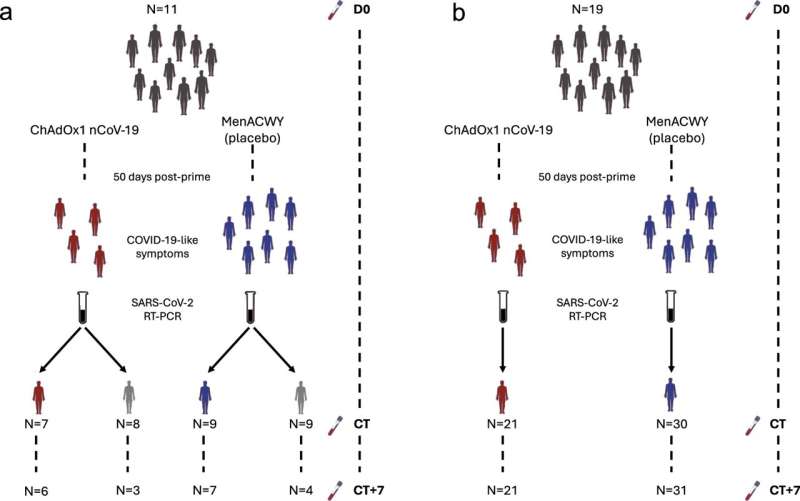This article has been reviewed according to Science X's editorial process and policies. Editors have highlighted the following attributes while ensuring the content's credibility:
fact-checked
peer-reviewed publication
trusted source
proofread
Study reveals how COVID-19 vaccines prevent severe disease

A study by scientists at the University of Oxford, has unveiled crucial insights into the way that COVID-19 vaccines mitigate severe illness in those who have been vaccinated.
Despite the global success of COVID-19 vaccination campaigns, concerns remain around the continued spread of this disease including in vaccinated individuals. For this reason, researchers at the Oxford Vaccine Group conducted an extensive investigation into the human immune response to COVID-19, in both vaccinated and unvaccinated individuals.
Employing contemporary "big-data" analyses, scientists can find novel associations between fundamental biological entities and indicators of the severity of a disease—to build patterns of health and disease.
Results of this study, published in the journal Nature Communications, categorically show a reduction in indicators of disease severity in those who had received the vaccine, demonstrating that the harmful inflammatory reaction to COVID-19 is less severe in those who have been vaccinated, when compared with those who haven't.
Professor Daniel O'Connor, Head of Bioinformatics at the Oxford Vaccine Group (OVG), led the study. He said, "These results confirm the efficacy of vaccination and its pivotal role in reducing the harmful consequences associated with COVID-19. The results of our research highlight the ChAdOx1 nCoV-19 vaccine's ability to modulate harmful responses to the SARS-CoV-2 virus, and therefore to reduce the severity of illness.
"The implications of these findings are far-reaching, offering evidence that is fundamental to future vaccine development and pandemic mitigation strategies. It also provides valuable guidance for policymakers and public health experts."
Professor Sir Andrew Pollard, Ashall Professor of Infection and Immunity and Director of the Oxford Vaccine Group, said, "Better understanding of how vaccines can reduce the severity of infections caused by viruses like COVID-19 is a key part of our preparedness to make effective vaccines against the next pandemic threat. Ongoing research is critical as we know the next one is coming but we don't know which virus or when it will be."
The study employed state-of-the-art technologies, including RNA-sequencing (to capture the level of genes produced by blood cells), to achieve these results. While the findings are promising, the study acknowledges limitations such as a focus on mild cases and sample size constraints, highlighting the need for further research utilizing advanced techniques to enhance resolution.
Key findings from the study include:
- Identification of unique responses to COVID-19 among vaccinated individuals, highlighting the vaccine's influence on responses to this disease.
- Demonstrated reduction in harmful responses associated with COVID-19 severity in recipients of the ChAdOx1 nCoV-19 vaccine compared with unvaccinated counterparts.
- COVID-19 in vaccinated individuals resulted in less COVID-19-induced blood cell count changes.
- Correlation between decreased levels of a particular class of molecules in blood (microRNAs) and elevated levels of inflammation, suggesting a regulatory role for these molecules in inflammatory responses to viral infection.
More information: Ruth E. Drury et al, Multi-omics analysis reveals COVID-19 vaccine induced attenuation of inflammatory responses during breakthrough disease, Nature Communications (2024). DOI: 10.1038/s41467-024-47463-6





















